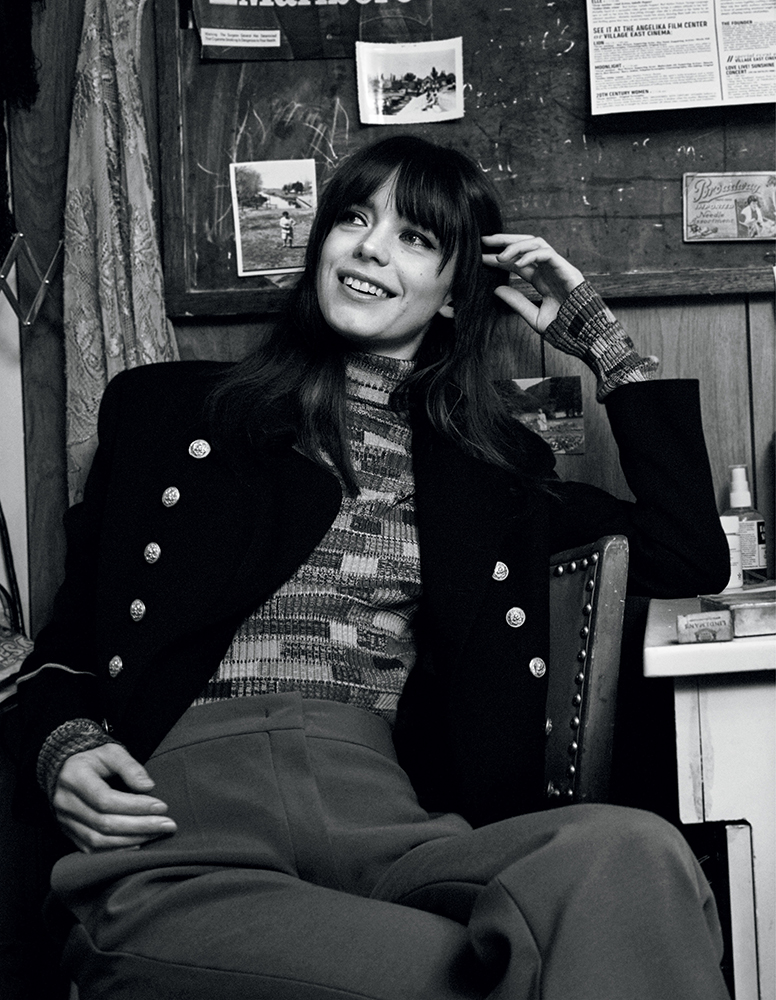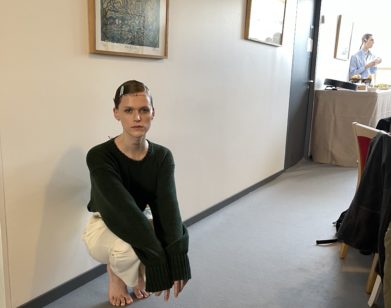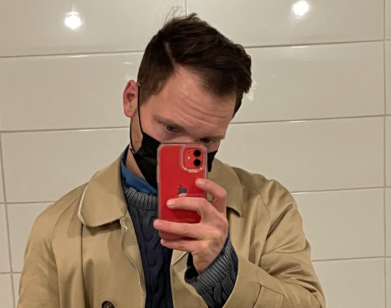Why Stacy Martin is the indie film darling of the decade
Stacy Martin was introduced to the world as a sex junkie. In her 2014 film debut, she played a younger version of the title character in Lars von Trier’s Nymphomaniac, an operatic, two-part exploration of sex addiction that included everything from a cat-o’-nine-tails to hospital intercourse. And yet, Martin didn’t flinch when tasked with depicting sex so realistic that von Trier used so-called “porn doubles” and prosthetic genitalia to sell the illusion of authenticity. It was the type of performance that many young actresses would shy away from, but it made the beguiling 28-year-old an instant star, drawing the attention of the fashion label Miu Miu, who made her the face of its first-ever fragrance.
Martin, who studied the Meisner technique of acting at the Actors’ Temple in London, put her training to good use over the next few years, appearing in such movies as Ben Wheatley’s dystopian head trip High-Rise [2016], Brady Corbet’s coming-of-age nightmare The Childhood of a Leader [2016], and the thriller Taj Mahal [2015], in which she performed in her native French. This year, she tackles the myth behind one of her home country’s cinematic greats, starring in the Cannes hit Godard Mon Amour, which centers on Jean-Luc Godard’s second marriage to the actress Anne Wiazemsky. So far, Martin has stuck to mostly art-house fare, breaking that streak late last year with an appearance in Ridley Scott’s All the Money in the World. It was a minor role, but it left Martin with a taste for bigger budget productions, something that will have to wait: she recently joined her second film with Corbet, Vox Lux, opposite Natalie Portman, and has a batch of projects on the horizon that will cement her reputation as an indie darling. While working in New York last February, Martin took a break to catch up with her friend, the journalist and fellow Miu Miu muse Hailey Gates.
HAILEY GATES: Let’s talk about how we met. I remember it so clearly: You and I were doing a Miu Miu campaign in matching plastic leather dresses, waiting for a shot to get set up, and you turned to me and said, “Do you believe in a two-state solution?” [laughs] And I was like, “This is going to be a very interesting week.” It was so exciting to be in this heightened environment with another person I could spar with and hang with, and have those kinds of conversations with.
STACY MARTIN: When we met, I was like, “This is exactly why I said yes to Miu Miu, because they choose women based on who they are and what they do.”
GATES: There’s a history of irreverent women who have worked with them.
MARTIN: So, what did you think of the movie?
GATES: What? I’m asking the questions here!
MARTIN: I’m interested in knowing how you see it from an American perspective.
GATES: I think because I was an insufferable Francophile as a child, I might not have the best American perspective on it. I remember when you first brought it up to me, you said that you didn’t feel like it was zeitgeist-y, but I felt the opposite watching it.
MARTIN: Really?
GATES: Yeah, because I was watching a woman [Anne Wiazemsky] who was witnessing an important man [Jean-Luc Godard] struggling to keep up with the times. Over the last four months, we’ve seen all of these important men struggle with becoming obsolete and not being able to use their voice in the same way. How pathetic he was really resonated with me. She feels like his nurse.
MARTIN: Every time I look at this dynamic, of an artist and his muse, these women are more like mothers. It’s a source of creativity, I’m sure, because they’re enabling this person to make art. But she’s doing it at such a high cost. There are only a few women who have managed to transcend the work of their partner, if they’re an artist. Frida Kahlo had to completely break free and establish herself. After the divorce happened, Anne became a writer. Can two artists actually be together? Or is there always one who has to sacrifice something?
GATES: It’s a good question. What’s the first Godard film you ever saw?
MARTIN: I can’t remember. I was very anti-French everything for a very long time.
GATES: Why were you opposed to French things?
MARTIN: For the stupid reason of living in France and not wanting to be in France, so everything French just freaked me out.
GATES: Why didn’t you want to be in France?
MARTIN: I’d moved back from Tokyo, and I felt like I was going backward. Every time my family moved, we’d move somewhere new, and moving back to Paris was like, “We’ve already done this place.” I was 13 when we came back, and it was a lot harder for me. I was French, but I didn’t feel French because I’d just been in Tokyo for about seven years.
GATES: Did you feel Japanese?
MARTIN: I don’t know what I felt. Oh wait, my first Godard film was probably Breathless.
GATES: And what did you think of him?
MARTIN: I really like his early stuff. It was so radical.
GATES: There’s a big discussion at the end of your film, where they’re pushing him, and they’re saying, “You must decide: it’s either cinema or politics.” I feel like we’re in this space right now where people are having to negotiate that.
MARTIN: I think if you’re going to try to make a political piece, a documentary is a lot more exciting. You want to hear the people who are involved, rather than just watching someone’s question about it.
GATES: There’s another question that comes up in the film: In a time of revolution, is it more important to make art that is in conversation with the revolution, or is it more important to make escapist art so that people can disappear and forget for a couple of hours?
MARTIN: I feel like every piece of art is a mirror of what’s going on in the present time, because the artist—a painter, a sculptor, a filmmaker— will be affected by what’s around them, so it seeps into their work.
GATES: What do you find yourself watching right now?
MARTIN: At the moment, I have not seen anything because I’m working. I find it really hard to connect to something. I did watch Mudbound on Netflix and then James White. I’m catching up on—
GATES: All of our friends’ movies. [laughs]
MARTIN: I need to see what my friends are doing, and I don’t have access to a lot of these films in the U.K.
GATES: Do you find yourself looking for escapist stuff, or do you want to be feeling feelings right now?
MARTIN: To be honest, I would rather read an article or speak to people about what’s going on. I’m not looking for answers in cinema. I feel like the answers will come from my friends and the discussions I have with them.
GATES: How are you choosing your parts? Do you feel like this question of cinema versus politics is factoring into that?
MARTIN: I haven’t changed the way I read a script or why I take a part or the possibility of working with a director, but I don’t feel as crazy asking the same questions. When I did Nymphomaniac, it was like, “Oh, there’s this amazing scene where you’re naked,” and I’m like, “Why? If it is just going to be pretty or amazing, why? What’s the point?” I feel like that process is a lot more understood, that people are a lot more cautious.
GATES: Were there moments when you couldn’t ask questions like that, or you couldn’t push back?
MARTIN: I feel like sometimes the questions weren’t heard or taken seriously. It was pretty much, “Don’t worry, we’ll sort it out.” Well, no, because by brushing something off, you also minimize the question. If you choose as a woman to work in cinema, the roles are smaller, not as diverse, and sometimes not as exciting. So when you try to have a conversation to say, “This part is lacking in this or that,” or, “I don’t understand who this person is,” or, “Why is she in this story?” people are very afraid of that.
GATES: And for the most part, you’re having these conversations with men.
MARTIN: I have a lot of women on my team, so they understand, but producers are men, a lot of directors are men, casting directors are men, first ADs are men, and it’s sometimes really exhausting to have to fight for stuff that is so minimal. I’m not even talking about pay. I’m just saying, “Hi, I don’t understand what you want from this scene. What’s the dynamic between this character and my character?” They just think it’s going to happen on set, but if it’s a male actor, I know very well that they get answers. And I’m like, “I called and you didn’t answer my phone calls. Why?”
GATES: It’s really fun to do this interview, P.S. I get to ask you probing questions.
MARTIN: Ask me everything.
GATES: Who the fuck are you? You spent your formative years in Tokyo. How did that make the Stacy Martin we know?
MARTIN: I guess it’s really unconscious, because I wasn’t aware of it. It’s not a normal thing for a kid to move to a new continent. The one thing that did really affect me was getting my visa card. We call it a green card here. I remember getting mine when I was 7; it said “alien card.” At that time, it was the only thing I could understand because I hadn’t learned the language, so I had my alien card, my name, and a photo. I immediately knew I would never fit in.
GATES: Did you think you were an alien?
MARTIN: In some ways. I just didn’t speak the language, I was taller than everyone else, and I was 7.
GATES: Did you eventually learn Japanese?
MARTIN: I did.
GATES: What do you do to prepare for a role?
MARTIN: I freak out. [laughs] I get really excited, I fight to get it, and then when I get it, I’m like, “Oh, I have to do it now.”
GATES: You are a shy person, so it’s amazing that you put yourself in these extreme situations.
MARTIN: I don’t know why I do it to myself. I have anxiety a lot of the time. Maybe it’s not anxiety, maybe it’s an adrenaline thing. I feel more comfortable doing it through my work than through my personal self.
GATES: It’s really weird googling your friends.
MARTIN: Don’t google me! It’s the worst thing in the world.
GATES: I can’t help myself. I have to do research before I talk to someone, even if I know them. I googled you, and it said that you have an extra toe.
MARTIN: What?
GATES: I’m kidding. It said that you studied Meisner. Is that true?
MARTIN: Yeah.
GATES: Shocking!
MARTIN: Breaking news: I didn’t go to drama school. I mean, I went and then dropped out. No, that’s not true. I got my first job and couldn’t be part of the final show of the year. I told them why, that it’s Lars von Trier, and it’s the lead, and I won’t be able to attend. I asked if there was any other way I could still finish my year. And they basically said no, that I needed to take my studies seriously, and that I wasn’t going to be part of the final show. I got really angry and frustrated about that situation, so I found this other school and found a teacher I really respected and wanted to work with, and it turned out to be the Meisner bit.
GATES: Do you want to do more theater?
MARTIN: I’ve never been in a play.
GATES: Would you want to?
MARTIN: If it was the right play and the right moment. I don’t want to do a play just for the sake of it. And I do feel like a lot of the plays these days veer more toward celebrity casting to bring in more people.
GATES: It’s crazy. You go to theater school, and now you have to become a movie star to do a play.
MARTIN: I don’t want to watch a celebrity in a play—I want to watch the play.
GATES: Who are your favorite playwrights?
MARTIN: It’s cliché, but I always go back to Chekhov. I always feel like I know The Seagull, and then I read it again, and I’m like, “I don’t know this play at all.” It’s so of our time. It’s put on way too much, but reading it is just such an experience.
GATES: Is there something you haven’t done yet that you really want to do? A rom-com? [laughs]
MARTIN: I would love to do a big Hollywood action movie. It’s another style, another way of working. When I did the Ridley Scott film All the Money in the World for a few days, it was such an unfamiliar setting. The vibe was different.
GATES: You don’t make a lot of American movies. What’s the difference?
MARTIN: It feels a lot more like a business, where you have a lot more people. I didn’t know anyone’s name, and for me that’s really strange. There’s not that kind of, “Oh, we’re making a film together” aspect. It’s very segregated. On French movies, they’re like, “Let’s have dinner, let’s have wine!” They have an hour lunch break, and they have wine on the table. It’s like a law—they have to have wine.
GATES: Damn. That’s so fun.
MARTIN: One bottle per table.
GATES: I used to be so annoyed working on French sets because they want to have this long break, and I’m embarrassingly American and want to work through the day and then be done.
MARTIN: On the movie I’m doing now, we have a half-hour lunch break, and I find that so shocking. I can’t eat in a half an hour.
GATES: Did you always want to be an actor?
MARTIN: I don’t know.
GATES: Do you still want to be an actor? [laughs]
MARTIN: I do and I don’t. It’s hard to keep a level of sanity in this business and to not get overwhelmed by the craziness of it, and by the egos and the frustrations of doing a job where you’re competing with at least 50 other people. I think if I can manage to deal with things in a way that is productive, then probably. It’s the most exhilarating and the most upsetting job at the same time. I don’t have any control of my life. I work, I leave my life for three months, and then I come back home, and I’m like, “Whoa, this is my life?” My real life feels less real than my work life, and that’s terrifying.
GATES: What films did you see as a kid that made you want to do this?
MARTIN: I didn’t want to do this.
GATES: You didn’t?
MARTIN: It was never like, “I’m going to be an actor.” I took a cinema elective in high school. You could do Latin or cinema, and I was like, “I’m not doing Latin.”
GATES: What kind of choices are those?
MARTIN: International schools. I really loved writing, and they were like, “Stacy, you’re pretty—you should be in front of the camera.” I don’t think I have the ability to write or direct something as well as I would want.
GATES: Maybe not yet.
MARTIN: A lot of people think they can do it and they can’t. People underestimate what it is to be a director. It’s a very hard job.
GATES: I don’t know if you feel this way, but I’m so obsessed with working collaboratively with people, and in some moments I wish that I had pursued a more solitary career, where I could start something by myself and finish something by myself.
MARTIN: But you’re also at the origin of a lot of the work that you make.
GATES: Absolutely, but my favorite part about it is making something with people. It’s such a frustrating circumstance that we put ourselves in, because it’s so hard to make a movie, it’s so hard to make a doc. You need so many things to align, and you need so many people to do their job that sometimes I envy people who can sit alone in a room and just work.
MARTIN: There’s something very interesting in that dynamic, where you want to work with people, and at the same time you want to run away and hide. The fact that I’m shy and would rather stay at home and watch a movie than go out frustrates me sometimes, so then I work. If I have time off, I freak out.
GATES: I can relate to that.
MARTIN: But I don’t change how I live socially—I don’t see more people, I don’t go out clubbing. I work more.
GATES: We don’t do exactly the same thing, but we have similar stretches of time away, and I feel like it’s hard to come home from these things sometimes.
MARTIN: Yeah, because you don’t really know where you belong. I come home and do things that are really out of character for me to do. I’ll go grocery shopping and forget my purse because I’ve spent a month on set with people feeding me, asking me if I want a bottle of water, picking me up in the morning. So I feel like a baby when I do my own grocery shopping. One, I don’t have my purse, and two, I’m freaking out because there are way too many pasta choices.
GATES: Have you been in a period piece?
MARTIN: Yes.
GATES: Have you done a movie where you’ve gotten your period?
MARTIN: Probably, yeah. I’m on the Nexplanon implant.
GATES: You’re on what?
MARTIN: You know the contraceptive implants? Rather than taking a pill, they put an implant in your arm.
GATES: Really? So you don’t get your period?
MARTIN: With the pill, it forces your cycle—education on periods, people! But with this one, it’s a weird thing where you have your period but you don’t necessarily bleed. I’ll have mood swings, and I’m like, “Why am I so upset?” So I’ve definitely had my period on films.
GATES: In a film?
MARTIN: As a role? Interestingly, no.
GATES: I feel like that must have come up in Nymphomaniac.
MARTIN: I don’t think so.
GATES: There’s got to be a period in that fucking movie somewhere.
MARTIN: I mean, there’s an abortion.
GATES: I had a dream the other night that I got my period in someone’s bed that I was sleeping in. I was really embarrassed. I took the sheets off and hid them. [laughs] Anything else you want to talk about? I can’t believe you were in a Ridley Scott movie. That’s so wild.
MARTIN: I know.
GATES: Have you seen it?
MARTIN: I have not.
GATES: Did you have to go back for the famed reshoots?
MARTIN: No.
GATES: Did you make as much as Marky Mark?
MARTIN: I made twice that.
HAILEY GATES IS AN ACTRESS, MODEL, AND WRITER, AND IS CURRENTLY THE HOST OF THE VICELAND SERIES STATES OF UNDRESS.







